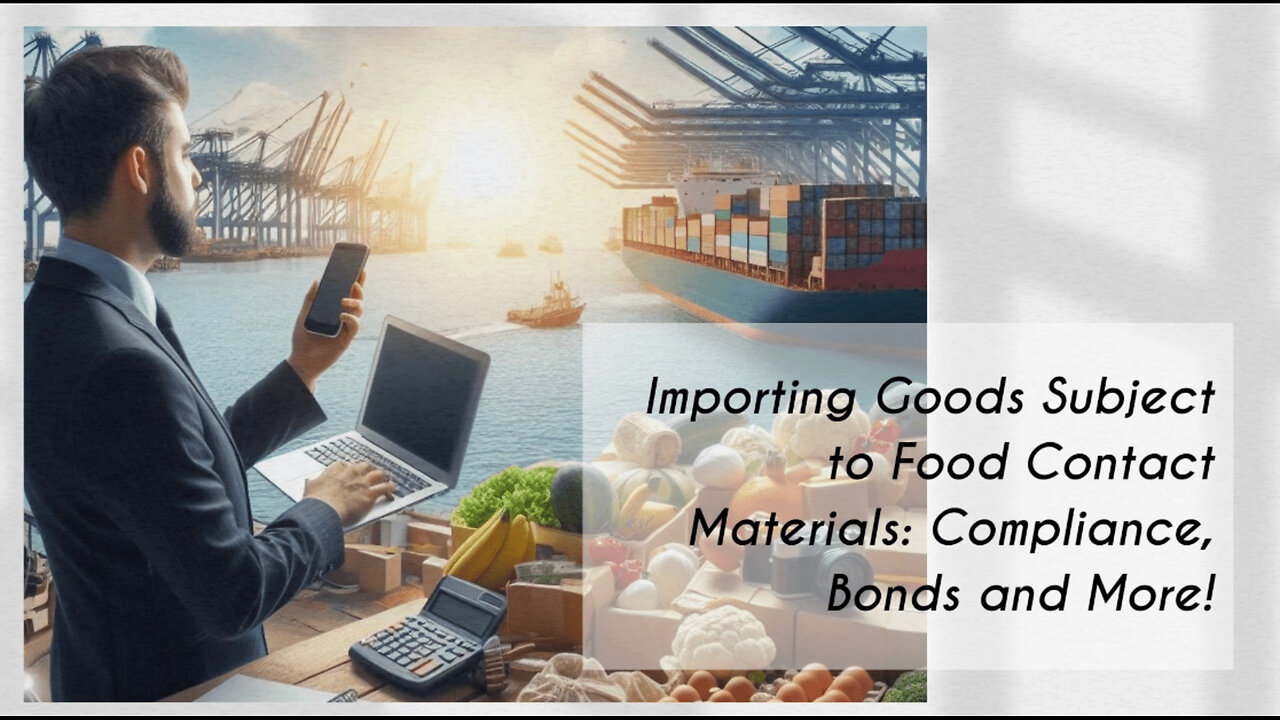Premium Only Content

Demystifying the Import Process: Navigating Food Contact Materials Regulations
ISF Solution | (832-904-9333)
[email protected] | www.isfsolution.com
Importing goods subject to food contact materials regulations can be a complex process that requires a thorough understanding of the applicable regulations, compliance requirements, customs bond, Importer Security Filing (ISF), and international trade agreements.
To begin, it is important to determine the specific regulations that apply to your product. These regulations can vary among countries and may include labeling, testing, and documentation requirements. Collaboration with the manufacturer or supplier is crucial in obtaining the necessary documents, such as test reports, certification, and product specifications, which are needed for customs documentation.
Securing a customs bond is another key aspect of the import process. A customs bond is an insurance policy that ensures payment of duties, taxes, or penalties that might arise during the importation. The bond requirements may differ from country to country, so it is crucial to work with a knowledgeable customs broker who can guide you in obtaining the appropriate bond.
The Importer Security Filing (ISF) is a mandatory electronic filing that must be submitted prior to the shipment leaving the foreign port. This filing provides important information about the cargo, such as the shipper, consignee, and commodity description. Ensuring accurate and timely filing is imperative to avoid delays or penalties, making it essential to work with a customs broker who understands the ISF requirements and can assist with the filing process.
Having a comprehensive understanding of international trade agreements and policies between the involved countries is also crucial when importing goods subject to food contact materials regulations. Certain trade agreements may provide reduced or waived duties for specific products, which can help streamline the import process and reduce costs. Consequently, it is important to be well-informed about these agreements in order to take advantage of any possible benefits.
In summary, the process of importing goods subject to food contact materials regulations requires a deep understanding of various aspects. Compliance with regulations, securing a customs bond, submitting the Importer Security Filing, and understanding international trade agreements are all essential components. Working with a knowledgeable customs broker is highly recommended to navigate this process successfully and ensure a smooth importation.
#usimportbond #isfcustomsbroker #uscustomsclearing #isfentry
Video Disclaimer Here: For educational purposes - No affiliation with US government sectors.
00:21 Understanding food contact materials regulations
01:18 Securing a customs bond
01:58 Importer Security Filing (ISF)
02:41 International trade agreements
-
 2:04:26
2:04:26
The Culture War with Tim Pool
4 hours agoWoke Has INFECTED Goth, Punk, & Metal, MAGA Must Save the Art | The Culture War Podcast
117K56 -
 1:12:25
1:12:25
Steven Crowder
4 hours agoCNN Declares J6 Pipe Bomber White & Nick Fuentes Interview Reaction
286K240 -
 LIVE
LIVE
Dr Disrespect
4 hours ago🔴LIVE - DR DISRESPECT - ARC RAIDERS - FREE LOADOUT EXPERT
1,308 watching -
 1:08:35
1:08:35
Rebel News
3 hours agoPublic Safety reviewing gun grab, Migrant offenders getting lighter sentences | Rebel Roundtable
24.1K3 -
 2:27
2:27
Buddy Brown
7 hours ago $0.80 earnedREDNECK JINGLE BELLS! | Buddy Brown
14.2K3 -
 18:38
18:38
The Illusion of Consensus
3 hours ago $0.52 earned“Those are FIGHTING words” – Dave Smith SNAPS at Alex Over Holocaust Denial Accusations
18.3K6 -
 55:40
55:40
The Rubin Report
5 hours agoCNN Host Goes Silent When Guest Proved She’d Done Her Homework on Drug Boat Facts
64.2K66 -
 51:25
51:25
iCkEdMeL
4 hours ago $4.57 earnedCandace Owens BACKS OUT of TPUSA Debate — Tim Pool MELTS DOWN, Fuentes Calls Her Out
36.1K30 -
 1:44:09
1:44:09
The Mel K Show
4 hours agoMORNINGS WITH MEL K - Let it Bleed-Things are Getting Spicy in DC 12-5-25
31.7K9 -
 LIVE
LIVE
LFA TV
17 hours agoLIVE & BREAKING NEWS! | FRIDAY 12/05/25
1,552 watching